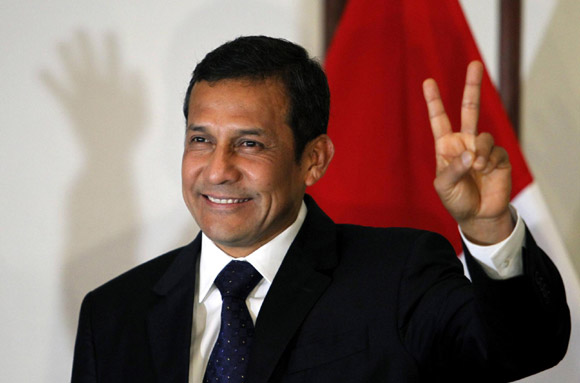Newsmakers
Ollanta Humala wins Peru election
(Xinhua)
Updated: 2011-06-07 13:14
 |
Large Medium Small |
LIMA - Leftist former military commander Ollanta Humala won Peru's presidential election after a bitterly fought runoff with the daughter of imprisoned ex-President Alberto Fujimori.
 |
|
Peru's newly elected President Ollanta Humala makes the victory sign to the press in Lima, the day after winning the elections, June 6, 2011.[Photo/Agencies] |
According to official figures published by the National Office for Electoral Processes (ONPE) on Monday, with 96 percent of the vote counted, Humala won 51.54 percent, as against 48.45 percent for Keiko Fujimori.
Fujimori was quick to recognize Humala's victory and conceded defeat.
"I recognize the triumph of Ollanta Humala. I salute his victory and wish him luck," Fujimori said.
She also said she was ready to open a dialogue with Humala's team to look for areas of cooperation to ensure national unity prevails in Peru.
Humala, who takes office in July for a five-year term until 2016, quickly got words of congratulations from across Latin America.
Heads of state from Argentina, Bolivia, Brazil, Chile, Nicaragua and Venezuela were among the first to congratulate Humala on winning the election.
This was the second time Humala ran for president in Peru after losing narrowly in 2006 to Alan Garcia in the second round of elections.
Humala began his election campaign with an ultra-nationalist plan similar to the one he had in 2006. But he quickly softened his policies in response to criticism from his opponents. In the last two months of the campaign Humala backed away from calls to nationalize certain companies or industrial sectors and also said he was committed to respecting the fragile democracy in Peru.
He said Peru would continue to welcome foreign investments during his administration and said his government will be one of "great transformation," with continued economic growth but much more social development as its key policy plank.
"Few have a lot and many have very little. The Peru Wins alliance wants to reduce that gap of inequality," Humala said during the campaign.
Humala has kept his reform proposals for social development, including a proposal for a guaranteed pension to people older than 65, and plans to build a hospital in each province and expand health services for Peru's poorest. He has also promised to increase the salaries of the armed forces, police and teachers, as well as increase the minimum salary paid to Peruvians through funds he hopes to generate from imposing a tax on windfall profits on mining companies.
Humala's key policies also include education reforms and more government support for the agricultural and other production sectors with more infrastructure, cheap credit and direct aid to farmers.
He has pledged to launch a frontal fight against corruption, drug trafficking and other crimes.
In his foreign policy agenda, Humala vows to strengthen relations with neighboring countries and the Latin American region. He has also promised to respect existing free trade agreements and guarantee judicial stability to foreign investment contracts.
The final weeks of the election campaign were marked by harsh personal attacks and two opposite political visions that left Peru's 30 million population bitterly divided.
But both Humala and Fujimori said prior to Sunday's polling that they would respect the official results and work to build a new government of national unity and political reconciliation.
| 分享按鈕 |